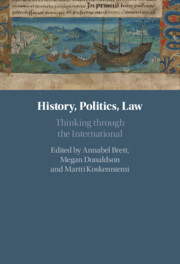Book contents
- History, Politics, Law
- History, Politics, Law
- Copyright page
- Contents
- Acknowledgments
- Notes on Contributors
- Introduction History, Politics, Law
- Part I Methods, Approaches and Encounters
- Part II Thinking through the International
- Law and Constructions of the Political
- Empires, States and Nations
- Institutions and Persons
- Economics and Innovation
- Gender
- 13 Gender in the State of Nature
- 14 Gender and the Lost Private Side of International Law
- Index
13 - Gender in the State of Nature
from Gender
Published online by Cambridge University Press: 28 September 2021
- History, Politics, Law
- History, Politics, Law
- Copyright page
- Contents
- Acknowledgments
- Notes on Contributors
- Introduction History, Politics, Law
- Part I Methods, Approaches and Encounters
- Part II Thinking through the International
- Law and Constructions of the Political
- Empires, States and Nations
- Institutions and Persons
- Economics and Innovation
- Gender
- 13 Gender in the State of Nature
- 14 Gender and the Lost Private Side of International Law
- Index
Summary
The idea of the state of nature was a fundamental way for early modern thinkers to make sense of the emergence of the political.1 With the help of this concept thinkers explained how complex political societies could arise from anarchic multitudes of human beings and how legal frameworks that regulated citizens’ relationships between one another could emerge. Referring to a state of nature, the often conflict-laden relationship between natural law and civil laws was explored, and questions regarding the legitimisation of political power, political rule, and political sovereignty were answered.2 Thomas Hobbes is often identified as, if not exactly having ‘invented’ the concept of the status naturalis, then at least having most influentially imagined it as a condition of war from which the commonwealth was established as a means of escape.3 From Hobbes onwards, the historiographical narrative goes, the ‘classical’, broadly Aristotelian notion that polities were founded upon, and grew organically from, the natural sociability of human beings was replaced by the notion that the political was contracted. The state became an artificial body, defined by its contrast with nature. While it is thus emphasised that seventeenth-century thinkers operated with a new and different concept of how states came into being – which of course then had consequences for how these states were defined – historians of political thought still, tacitly perhaps, assume that one of the most important features of the classical conception of statehood had remained. Politics and the polity, whether organically grown or contracted from fear and necessity, seem to centre on male citizens and/or male subjects. The ‘state’ is seen as a male entity and politics as being constructed in opposition to the social, or the private.4 Therefore, historical enquiries into seventeenth-century philosophy of the state have focused on the relationship among male citizens and the male citizens’ relationships to a government, a sovereign entity, and political power itself. Male–female relationships have been seen as part of the apolitical, private sphere, just as broader questions pertaining to the social dimensions of human beings did not play any role in early modern narratives of the birth and the manifestation of the political.5
- Type
- Chapter
- Information
- History, Politics, LawThinking through the International, pp. 341 - 356Publisher: Cambridge University PressPrint publication year: 2021



